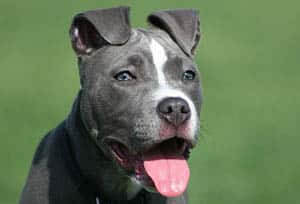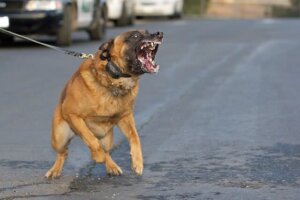Do you know how to prevent a dog from attacking you? Do you know what to do if a dog attacks anyway? Learn the signs – it might save your life.
Dog attacks, in some cases, can be prevented.
Dogs have personal spaces just like a human. However, they cannot communicate their need for space as humans can. Therefore, dogs might nip, bite, or attack a person that threatens their space.
Not disturbing a dog that is eating, sleeping, or drinking is a good place to start if you do not want to be bitten. Also, understanding animal behavior, what makes dogs attack, and body language could prevent you from becoming an attack victim in the future.
If you have young children, it is imperative you teach them these things – even around the family dog. Dog attacks are more likely to happen to small children, especially by a dog they know.
Tips for Staying Safe around Dogs
Whether you are around your dog, the neighbor’s dog, or one you found on the street, deploy these strategies to avoid being attacked.
Always Look at the Dog’s Body Language
Put space between you and the dog. Look for body language from the dog telling you that they feel scared or threatened (which increase the likelihood of an attack).
Some indications the dog is uncomfortable include:
- Tensed up body
- Stiffened tail
- Furrowed Brow
- Ears or head pulled back
- Intense stares
- Continued backing away
- Growling
By putting space between you and the dog, you are letting them know that you are not a threat. Even though you put this space between the two of you, never turn your back to the dog and do not run away. Dogs have an instinct to chase anything running from them – and they will do so to you.
Know What to Do if a Dog Is About to Attack
If a dog looks like they are about to attack because they show the body language above, try the following:
- Never Scream or Run: Screaming and running away only further agitates an already aggravated dog. They naturally chase what runs away, and screaming could scare them – forcing them to attack.
- Stay Motionless and Avoid Eye Contact: Stand still, put your hands and arms at your side, and avoid making eye contact with the dog. If you can, turn yourself sideways to the dog. This makes you appear as a narrower object.
- Wait for the Dog to Lose Interest: Continue standing still until the dog loses interest. The dog should walk away and be far enough way before you slowly back away. Keep backing away. Never turning your back until the dog is out of sight.
- Feed the Dog if They Attack: If the dog does attack you, feed them any object you have on you, including a jacket, backpack, purse, or even a bike. The more objects you can put between you and the dog the better.
- Roll into a Ball: If the dog knocks you down, curl quickly into a ball and put your hands over your ears. Remain motionless, never scream, and do not move. The dog might be able to bite, but they cannot grip onto you while you are in a tight ball. Remember to protect your vital areas, including your head, neck, and torso. In the ball, face the ground – this can also keep the dog from latching onto your thigh.
- If the Dog Latches, Do Not Pull Away: If the dog does bite, do not pull away. This only tears your flesh more and causes further injury.
Know Why Dogs Attack
A common misconception is that dogs attack because of their breed. This is not true. While some breeds can certainly be deadly, it comes down to training, environment, and medical factors. A Pit Bull can be the sweetest family dog that never bites another, while an untrained or purposely trained to be vicious Pit Bull could be deadly.
You and your children should be wary of all breeds of dogs, and never approach one you do not know. Furthermore, if you have small children in the house, never leave them alone with your family pet – regardless of how friendly they might be. Family pets can still bite without warning. And with small children involved, it can be tragic.
The CDC estimates there are 4.7 million bites each year in the United States; therefore, dog bites are not rare. One out of every 69 people is bitten per year by a dog. So, someone in your neighborhood is likely to be bitten this year.
Here is why:
Medical Issues
A common cause of dog bites stems from medical issues. A dog’s threshold for how they react to stimulus or stress is lower, which means they are at high-risk for stress and anxiety (common causes of attacks).
Also, dogs with hearing or vision problems startle easily. Older dogs who have limited mobility cannot remove themselves from a situation bothering them, so they attack what is in their space instead.
Other medical conditions that can lead to aggressive behavior include thyroid levels.
If a dog that has never bitten or shown aggression bites, veterinarians often suspect a medical cause.
Poor Socialization
There is a reason veterinarian, trainers, and consultants all tell dog owners to socialize their dogs from their puppy years and on. Socializing puppies with people of all ages, especially small children and other animals, help them know how to react in social situations. Improper socializing during the first three months of a puppy’s life may lead to severe behavioral issues, including aggression, fear, and avoidance – all risk factors for bites.
Using a History of Punishment
Dogs that are physically abused are more aggressive. Raising your voice or physically striking your dog might increase the risk of them attacking.
Guarding Resources
Dogs are primitive, and resources to them are linked to survival instincts. They guard their bed, food, and water. If they feel these areas are under threat, they will attack to protect them.
Frustration or High Arousal
Sometimes, a dog is overly aroused or frustrated, which forces them to become aggressive. Another instance would be when two dogs are fighting, and one owner tries to get in between them to break it up. Placing hands in between fighting dogs almost guarantees you will be bitten.
Your Rights If You Are Attacked
While dogs might be unpredictable, it is their owners who are responsible for them. If a dog attacks you or a loved one and causes serious injury, you may be entitled to compensation.
To explore your options and exercise your rights, you need an attorney that has experience handling dog attack cases.
To get started, schedule a free case evaluation with myself, Jeffrey H. Penneys, Esq. Call 800-465-8795 (office), 215-771-0430 (cell), 215-987-3550 (office) or fill out my online contact form and ask me a question.







